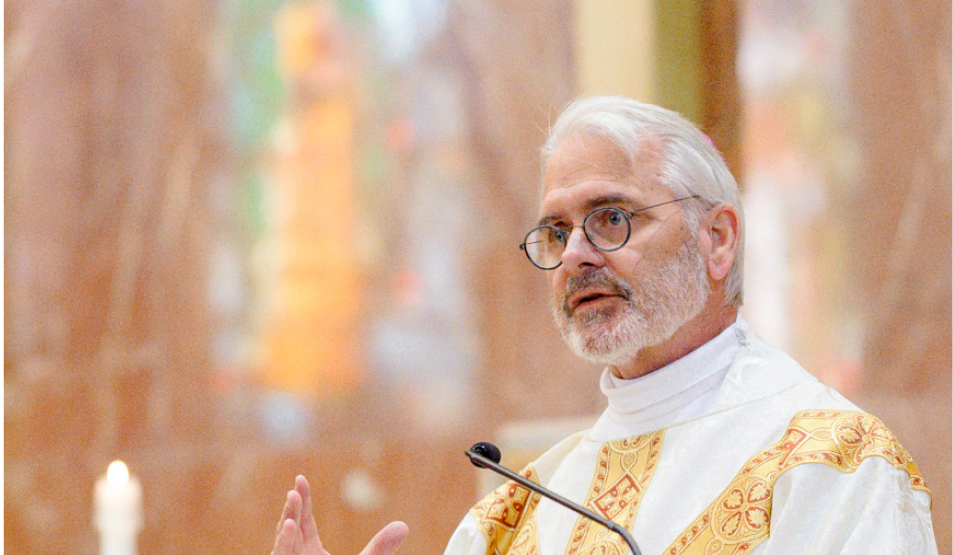The United States Conference of Catholic Bishops (USCCB) has elected Archbishop Paul S. Coakley of Oklahoma City as its next president and Bishop Daniel E. Flores of Brownsville, Texas, as vice president, following a vote at the bishops’ plenary assembly in Baltimore this week.
Archbishop Coakley was elected president on the third ballot after receiving 128 votes to Bishop Flores’s 109 in a run-off. Bishop Flores was then chosen as vice president on the first ballot from the remaining nine candidates.
Both bishops will begin their three-year terms at the conclusion of the plenary meeting on Thursday, succeeding Archbishop Timothy P. Broglio of the Military Services and Archbishop William E. Lori of Baltimore.
The result marks a departure from earlier decades when the sitting vice president typically advanced to the presidency. Archbishop Lori, who currently holds that post, was ineligible this year because of the age limit for candidates.
Archbishop Coakley, 70, has served as Archbishop of Oklahoma City since 2011 and was previously Bishop of Salina, Kansas. Born in Norfolk, Virginia, in 1955, he attended the University of Kansas where he took part in the Integrated Humanities Programme, a movement known for inspiring numerous priestly vocations in the 1970s, notably Dom Philip Anderson, abbot of Clear Creek Abbey in Oklahoma.
He was ordained to the priesthood in 1983 and appointed a bishop by Pope John Paul II in 2004. Pope Benedict XVI later appointed him to Oklahoma City in 2010.
As a bishop, Coakley has been a consistent advocate for the dignity of human life and the vulnerable. In 2022, after Oklahoma enacted one of the most restrictive abortion laws in the United States, he praised state legislators “for supporting pro-life measures” and said that building a culture of life requires “recognising the inherent dignity of every person [and it] requires the protections afforded by pro-life legislation and a profound change of heart.”
On issues of migration, Archbishop Coakley has sought a balance between security and compassion. Earlier this year he said deportations were “creating fear and even distress for our immigrant, migrant, and refugee neighbours who have arrived in search of the same dreams that awaited many of our ancestors at a different moment in time.” Yet he also affirmed that “illegal immigration is wrong, and renewed efforts should be considered to protect our nation’s borders,” noting the dangers of trafficking and criminal exploitation.
Bishop Flores, 64, has led the Diocese of Brownsville since 2009 and previously served as auxiliary bishop of Detroit. A native of Palacios, Texas, he was ordained a priest in 1988 and holds a doctorate in sacred theology. Before his episcopal appointments, he taught theology at the University of St Thomas in Houston and served as vice rector of St Mary’s Seminary.
A past chairman of the USCCB Committee on Doctrine, Bishop Flores has become a leading advocate of synodality in the American Church and currently serves as a member of the Ordinary Council of the General Secretariat for the Synod in Rome.
In 2017, he stated that supporting mass deportations constitutes “formal cooperation with an intrinsic evil,” and he has urged Catholics to engage in “civil conversation … to seek what is good and make the priority how to achieve it and how to avoid what is evil.”
Many secular outlets, including The Independent and the Associated Press, have described this as a “conservative win” for the U.S. Church. However, Church commentators note that both Archbishop Coakley and Bishop Flores represent the moderate wing of the episcopate on questions of liturgical uniformity and the Latin Mass. Their “conservatism,” they suggest, is confined to moral teaching and social policy, particularly the defence of life and family.
(Photo credit: ALBERTO PIZZOLI/AFP via Getty Images)

















